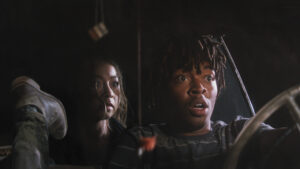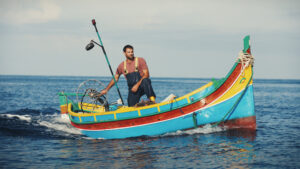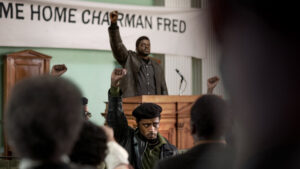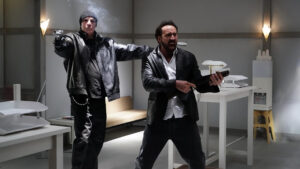Films to Watch (Virtually) at Sundance 2021
Written by: Christopher Llewellyn Reed | January 25th, 2021

This year’s Sundance Film Festival, which runs January 28 to February 3, may not offer the same live experience as in the past, but that doesn’t mean the films to be screened (virtually) aren’t any good. With 71 features from 29 countries, the program may be slimmer than last year’s (which showcased 118), yet no less cinematically robust. Critics Melanie Addington and Hannah Tran join me in each recommending 5 films they’d most like to see. Here are what we think will shine.
MELANIE ADDINGTON
Picking just five is almost an impossible task, but here are five )one of which I have already seen) for which I have high hopes for their innovations and success.

Rita Moreno: Just a Girl Who Decided to Go for It (Mariem Pérez Riera): First up is this documentary, which can be great, mediocre or bad and I will love it since I love Rita Moreno (West Side Story). With her EGOT status (Emmy, Grammy, Oscar, Tony) and over 70 years of entertaining audiences, Moreno shares her journey with director Mariem Pérez Riera. But more than just the story of a beloved icon, her journey explores racial and sexist discrimination within the studio system.
Ailey (Jamila Wignot): This, which I just watched via screener, is an in-depth journey through Alvin Ailey’s pioneering choreography, from director Jamila Wignot (Town Hall), and a biography of the man who founded the Alvin Ailey American Dance Theater. For someone like me who does not appreciate dance nearly enough, this film was a great first step into exploring dance on film.
Summer of Soul (…or, When the Revolution Could Not Be Televised) (Questlove): Unlike dance, music-in-film is a subgenre that actually is my favorite. With Questlove (of The Roots fame) directing, Summer of Soul (…or, When the Revolution Could Not Be Televised) is destined to be a hit film focused on the Harlem Cultural Festival summer-music series, which took place the same year as Woodstock. Found-footage documentaries highlighting an important part of our music legacy make for critical cinema. Despite over 300,000 in attendance and musicians like Nina Simone, B.B. King, Stevie Wonder, the Staple Singers and more, there was little coverage of this at the time.

First Date (Manuel Crosby/Darren Knapp): One of the best things we can enjoy, after the year we all just had, is a simple comedy. Writer-directors Manuel Crosby and Darren Knapp present us with exactly that with their First Date. I have not explored in depth the cast or plot of this movie but with a vengeful cat lady in the synopsis and a guy who just wants to take a girl out on a date, this one is sure to be a fun ride.
R#J (Carey Williams): I always have high hopes for modernizations of Shakespeare, even if I’m rarely satisfied. With Carey Williams’ R#J there is a chance to do something really interesting with the work. Following the story of Romeo and Juliet, but with Gen Z-ers and cell phones, the classic tragic love story is one that should be the biggest risk-taker at Sundance.
HANNAH TRAN
One for the Road (Baz Poonpiriya): One of the opening films of the festival, One for the Road combines the sensibilities of some of the most fascinating talents, both old and new. Directed by Thai director Baz Pooonpiriya, whose 2017 film, Bad Genius, became the most internationally successful Thai film of all time, and produced by directing legend (and personal favorite) Wong Kar-Wai (In the Mood for Love), this is a project that I could not miss. Telling the story of a pair of friends who go on a quest to return various items to one of their ex-girlfriends after he finds out he is dying, One for the Road is hopefully the spellbinding and moving story promised by these two men’s careers.

In the Same Breath (Nanfu Wang): From the director of the 2019 Sundance breakout documentary, One Child Nation, Nanfu Wang’s latest endeavor sounds not only bold, but essential. Tracking the spread of Covid-19, Wang critically investigates the response from both the Chinese and American governments and seeks to recognize the individuals who fought against them in order to expand transparency.
Prime Time (Jakub Piątek): My interest in this film was almost immediate upon reading its plot synopsis, which tells of a 20-year-old who hijacks a radio station, taking two hostages in tow, in an attempt to deliver a mysterious message. Taking place in a single location in post-communist Poland, Prime Time appears to be the type of tense and wild directorial debut that one hopes to find at Sundance.

Luzzu (Alex Camilleri): Telling the story of a Maltese fisherman struggling to provide for his family in the face of an evolving and ruthless industry that forces him into a black-market fishing operation, Luzzuexcites me with its unconventional technical aspects. Taking a note from neorealism, Luzzu features a cast made up of real-life Maltese fishermen, all non-actors, and is notably one of the country’s first major films.
Wild Indian (Lyle Mitchell Corbine Jr.): Described as being “destined to be a touchstone in indigenous cinema,” Wild Indian centers around two Anishinaabe men who must confront the painful truth about their own cover-up of a murder that one of them committed when they were boys. Featuring performances by Michael Greyeyes, Chaske Spencer and Jesse Eisenberg, its seldom-explored territory appears both complex and compelling.
CHRIS REED
At the Ready (Maisie Crow): A documentary that follows a group of Latinx teens in Texas, who live close to the Mexican border, as they prepare for careers in law enforcement via after-school classes, At the Ready, from director Maise Crow (Jackson), promises to be a profile in earnest conflict. How does these young hopefuls’ sense of personal identity clash with the path they have chosen? I can’t wait to find out.

Judas and the Black Messiah (Shaka King): Daniel Kaluuya (Queen & Slim) and Lakeith Stanfield (Crown Heights) star in a film about the late Black Panthers leader Fred Hampton, killed by law enforcement in the early hours of the morning on December 4, 1969. In an era where many in our nation finally seem poised to reckon with systemic racism and police brutality, this important biopic from director Shaka King (Newlyweeds) should offer much cinematic food for thought.
My Name Is Pauli Murray (Julie Cohen/Betsy West): Fresh off their success with the 2018 RBG, directors Julie Cohen and Betsy West return with a new documentary portrait, this one on Pauli Murray, a true renaissance woman if there ever was one. Born in 1910 (she died in 1985), Murray was a Black feminist, activist, lawyer, poet … and Episcopal priest. I confess to knowing nothing about her, but given who is making the film and the scope of Murray’s achievements, I am sure I will enjoy having my mind opened.
Passing (Rebecca Hall): Actress Rebecca Hall (Permission) makes her directorial debut with Passing, a study in the different ways two Black women, friends since childhood, have chosen to adapt to life in early 20th-century New York. One passes as white, the other not. Shot in black and white, this adaptation of Nella Larsen’s eponymous 1929 novel stars Tessa Thompson (Sylvie’s Love) and Ruth Negga (Loving), and looks to explore race and gender in a profoundly moving way, especially since both leads and the director all come from mixed-race backgrounds, themselves, lending personal urgency and experience to the narrative.

Prisoners of the Ghostland (Sion Sono): How about some demented mayhem? That’s what I’m looking forward to in Prisoners of the Ghostland, from Japanese director Sion Sono (Why Don’t You Play In Hell?). Nicolas Cage (Mandy), Bill Moseley (The Horde) and Sofia Boutella (Climax) star in this violent mix of different genres in which Cage, apparently outdoing every one of his previous over-the-top performances, goes after Moseley’s missing granddaughter (Boutella), all the while wearing a suit that will explode after five days. I’m all in.
Curious how you can see some or all of these? Visit the festival website for information on tickets to virtual screenings.

